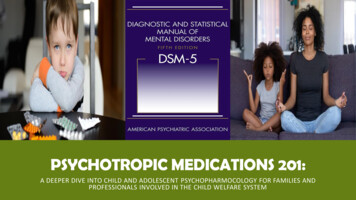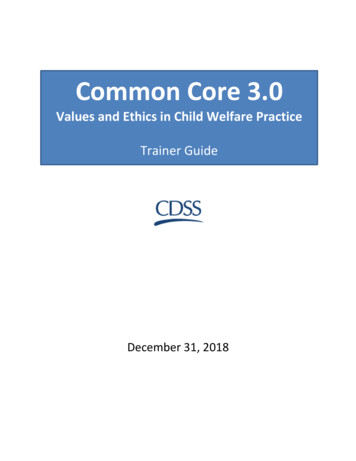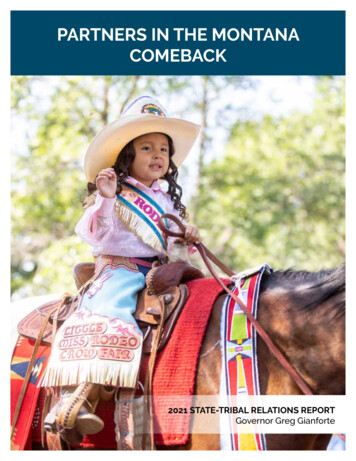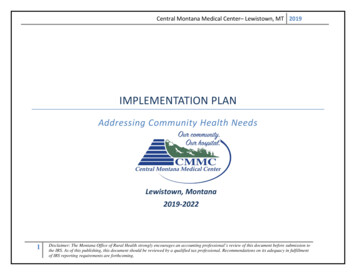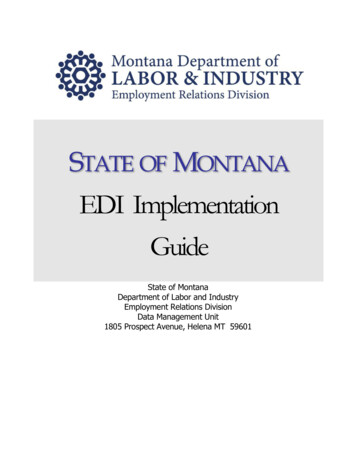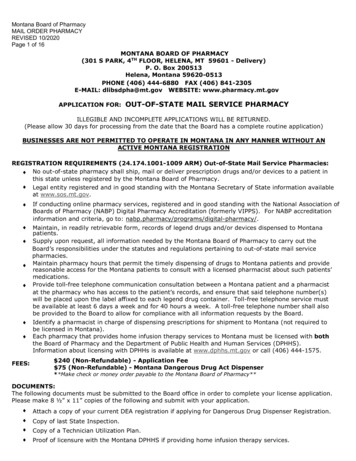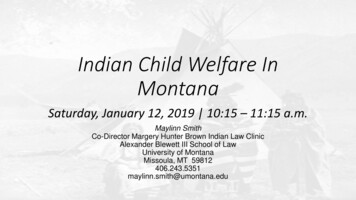
Transcription
Indian Child Welfare InMontanaSaturday, January 12, 2019 10:15 – 11:15 a.m.Maylinn SmithCo-Director Margery Hunter Brown Indian Law ClinicAlexander Blewett III School of LawUniversity of MontanaMissoula, MT 59812406.243.5351maylinn.smith@umontana.edu
The Short and Long-TermBest InterestReasons for State Compliance with ICWA
Brief history of ICWA Federal remedial legislation passed in 1978 Imposes higher standards on state dependency and neglect cases involvingIndian children. Based on evidence showing higher numbers of Indian children wereremoved from their families by public and private state agencies andplaced in non-Indian families Focuses on reversing this practices of removing Indian children from theirfamilies without sufficient grounds of actual harm and placing them in nonIndian or non-extended family care based on best practices Recognizes the damage caused by separating Indian children from theircommunities and fracturing their cultural identities Recognizes that compliance with ICWA is in an Indian child’s long-term bestinterest.
Foster care systems In 2015 according to MT DPHHS, Indian children make upapproximately 10 percent of Montana’s population but represent 36percent of foster care children. In Montana, Indian Children are approximately 4.1 times more likelyto be in foster care than white children. Nationally since 2009, Native American children have had the highestrates of representation in foster care according to 2013 data from theAdministration on Child, Youth and Families. Except for the Confederated Salish and Kootenai Tribes andChippewa-Cree Tribes, which have direct IV-E programs, Montanahandles IV-E dollars for all Indian children in Montana.
ICWA and Implicit Bias Is the disproportionate representation of Indian children the result ofactual higher risks associated with their situation or because ofperceived risks based on a lack of cultural awareness? Adverse Childhood Experiences [ACE] issues triggered by removal canhave long term negative impacts on children. Does implicit bias impact compliance with ICWA cases and potentiallyincrease expenses to the state associate with non-kinship careplacement?
How does ACE impact ICWA cases? Adverse childhood experiences (ACEs) are a significant risk factor forsubstance use disorders and can impact prevention efforts inproviding supportive services. Adverse childhood experiences (ACEs) are triggered by stressful ortraumatic events, including abuse and neglect, but can also becreated by separation from family and culture. ACEs are strongly related to the development and prevalence of awide range of health problems throughout a person’s lifespan,including those associated with substance misuse and futureinvolvement in the justice system.
ACE PyramidResearch evaluating therelationship betweenexposure to traumaticstressors and a persons longterm well- being. Discoveredthat many health and socialproblems likely would benefitfrom understanding many ofthese issues arise as aconsequence of adversechildhood experiences.
ICWA helps break the effects of ACE Gold Standard for working effective with families in need of services. Helps break cycles of overrepresentation of Indian people in thestatistics: Drop out rates in educationSuicide ratesIncarceration ratesPovertyACE factors
What is Needed to Improve Compliance? Cultural Awareness Training for child protection workers and other serviceproviders Culturally responsive services to address identified needs Supportive service to prevent the initial removal from family and anyrecurring removals after reunification Placement with extended family upon removal Ongoing meaningful contact with extended family while reunification isattempted if placement with extended family is not possible due toreunification efforts Changes in state law to prohibit non-extended family foster parents fromintervening in ICWA cases until a legal determination has been made thatgood cause exists to avoid the statutory placement preferences
What Might Culturally AppropriateServices Look Like? Gentle Action Theory using creative and non-invasive culturally sensitiveactions to improve a situation Trauma-informed therapy that incorporates best practices in addressinghistorical and intergenerational trauma experiences by many Indianfamilies Counseling that incorporates a tribal holistic, restorative approach andalso recognizing the importance of spirituality on healing Identifying Tribal/Native faith healers or medicine/holy men or womenwithin the Tribe who make help facilitate cultural appropriate services. Positive Indian Parenting curriculum, which is based on tribal beliefs andcustoms, and which may provide clients support for improving theirparenting skills with a strong culture-based background.
How Montana is Leading the WayInnovative Practices in ICWA ICWA Court- Billings Began handling cases in July 2017, is only the fifth ICWA Court in the nation. Currently limits it focus to children from Crow, Northern Cheyenne and theAssiniboine or Sioux Tribes of Fort Peck. Approximately 75 percent of removed Indian children are placed in a homewith a tribal connection — mostly to relatives or a tribally approved fosterhome. A more collaborative approach-improved relationships between all thevarious stakeholders is key to the court’s success. Information is showing fewer re-removals in Yellowstone County's ICWA casesthan in non-ICWA cases
Challenges to ICWA Unique relationship between Tribes and Federal government Not a race based statute Remedial legislation to address past federal policies harmful to tribesand Indian families Reflects best practices and the best interest standard oftenrecognized through kinship care type requirements under state law. Early compliance can help reduce cost to the state but throughplacement costs and litigation costs
Indian Child Welfare In Montana . Missoula, MT 59812 406.243.5351 maylinn.smith@umontana.edu. The Short and Long-Term Best Interest Reasons for State Compliance with ICWA . Brief history of ICWA Federal remedial legislation passed in 1978 . ICWA Court- Billings Began handling cases in July 2017, is only the fifth ICWA Court in the .

